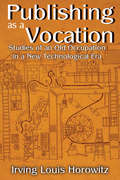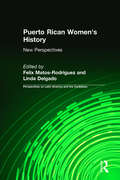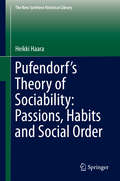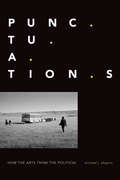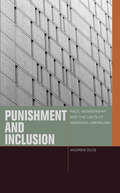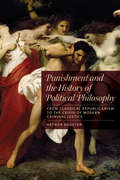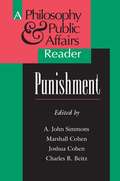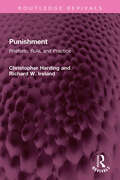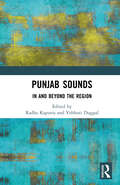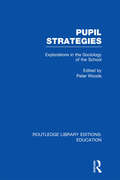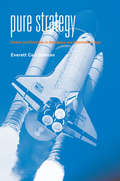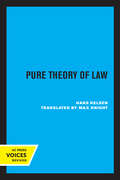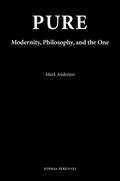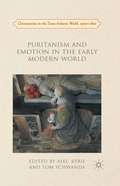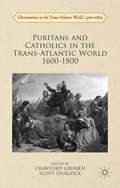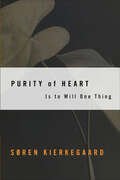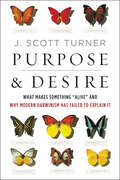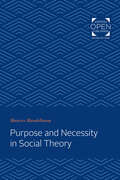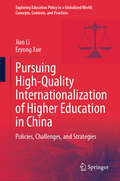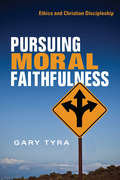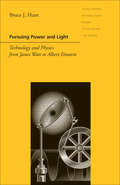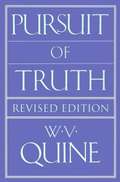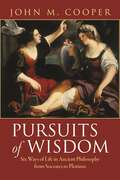- Table View
- List View
Publishing as a Vocation: Studies of an Old Occupation in a New Technological Era
by Irving HorowitzThe linkage of politics and technology is now the driving momentum in communication. Publishers are now part of the astonishing transformation of the slow to the instant. From twitters to bloggers, the communication of ideas can now be accomplished in a matter of minutes, not weeks, months, or even years.Horowitz believes that at its best, information technology can be harnessed to facilitate the expression of democratic thought. In providing better access to production and technology, there is great hope to liberate humankind from ignorance and ideology—and imagination is what the purpose of publishing is and always will be about. If politics is the art of the possible, then technology can be harnessed to the higher art of transforming scientific principles into everyday practices.Publishing as a Vocation places publishing in America in its political and commercial setting. It addresses the political implications of scholarly communication in the era of new computerized technology. Horowitz examines problems of political theory in the context of property rights versus the presumed right to know, and the special strains involved in publishing as commerce versus information as a public trust. Offering a knowledgeable and insightful view of publishing in America and abroad, this book makes an important contribution to the study of mass culture in advanced societies.
Puerto Rican Women's History: New Perspectives
by Felix Matos-Rodriguez Linda DelgadoA survey of the topics in gender and history of Puerto Rican women. Organized chronologically and covering the 19th and 20th centuries, it deal with issues of slavery, emancipation, wage work, women and politics, women's suffrage, industrialization, migration and Puerto Rican women in New York.
Pufendorf’s Theory of Sociability: Passions, Habits and Social Order (The New Synthese Historical Library #77)
by Heikki HaaraThis book centres on Samuel Pufendorf’s (1632–1694) moral and political philosophy, a subject of recently renewed interest among intellectual historians, philosophers and legal scholars in the English-speaking world. Pufendorf’s significance in conceptualizing sociability in a way that ties moral philosophy, the theory of the state, political economy, and moral psychology together has already been acknowledged, but this book is the first systematic investigation of the moral psychological underpinnings of Pufendorf’s theory of sociability in their own right. Readers will discover how Pufendorf’s psychological and social explanation of sociability plays a crucial role in his natural law theory. By drawing attention to Pufendorf’s scattered remarks and observations on human psychology, a new interpretation of the importance of moral psychology is presented. The author maintains that Pufendorf’s reflection on the psychological and physical capacities of human nature also matters for his description of how people adopt sociability as their moral standard in practice. We see how, since Pufendorf’s interest in human nature is mainly political, moral psychological formulations are important for Pufendorf’s theorizing of social and political order. This work is particularly useful for scholars investigating the multifaceted role of passions and emotions in the history of moral and political philosophy. It also affords a better understanding of what later philosophers, such as Smith, Hume or Rousseau, might have find appealing in Pufendorf’s writings. As such, this book will also interest researchers of the Enlightenment, natural law and early modern philosophy.
Punctuations: How the Arts Think the Political
by Michael J. ShapiroIn Punctuations Michael J. Shapiro examines how punctuation—conceived not as a series of marks but as a metaphor for the ways in which artists engage with intelligibility—opens pathways for thinking through the possibilities for oppositional politics. Drawing on Theodor Adorno, Alain Robbe-Grillet, and Roland Barthes, Shapiro demonstrates how punctuation's capacity to create unexpected rhythmic pacing makes it an ideal tool for writers, musicians, filmmakers, and artists to challenge structures of power. In works ranging from film scores and jazz compositions to literature, architecture, and photography, Shapiro shows how the use of punctuation reveals the contestability of dominant narratives in ways that prompt readers, viewers, and listeners to reflect on their acceptance of those narratives. Such uses of punctuation, he theorizes, offer models for disrupting structures of authority, thereby fostering the creation of alternative communities of sense from which to base political mobilization.
Punishment and Inclusion: Race, Membership, and the Limits of American Liberalism (Just Ideas)
by Andrew DiltsAt the start of the twenty-first century, 1 percent of the U.S. population is behind bars. An additional 3 percent is on parole or probation. In all but two states, incarcerated felons cannot vote, and in three states felon disenfranchisement is for life. More than 5 million adult Americans cannot vote because of a felony-class criminal conviction, meaning that more than 2 percent of otherwise eligible voters are stripped of their political rights. Nationally, fully a third of the disenfranchised are African American, effectively disenfranchising 8 percent of all African Americans in the United States. In Alabama, Kentucky, and Florida, one in every five adult African Americans cannot vote.Punishment and Inclusion gives a theoretical and historical account of this pernicious practice of felon disenfranchisement, drawing widely on early modern political philosophy, continental and postcolonial political thought, critical race theory, feminist philosophy, disability theory, critical legal studies, and archival research into state constitutional conventions. It demonstrates that the history of felon disenfranchisement, rooted in postslavery restrictions on suffrage and the contemporaneous emergence of the modern “American” penal system, reveals the deep connections between two political institutions often thought to be separate, showing the work of membership done by the criminal punishment system and the work of punishment done by the electoral franchise.Felon disenfranchisement is a symptom of the tension that persists in democratic politics between membership and punishment. This book shows how this tension is managed via the persistence of white supremacy in contemporary regimes of punishment and governance.
Punishment and the History of Political Philosophy
by Arthur ShusterContemporary philosophy still lacks a satisfying theory of punishment, one that adequately addresses our basic moral concerns. Yet, as the crisis of incarceration in the United States and elsewhere shows, the need for a deeper understanding of punishment's purpose has never been greater.In Punishment and the History of Political Philosophy, Arthur Shuster offers an insightful study of punishment in the works of Plato, Hobbes, Montesquieu, Beccaria, Kant, and Foucault. Through careful interpretation of their key texts, he argues that continuing tensions over retribution's role in punishment reflect the shift in political philosophy from classical republicanism to modern notions of individual natural rights and the social contract.This book will be vital reading for political theorists, philosophers, criminologists, and legal scholars looking for a new perspective on the moral challenges faced by the modern criminal justice system.
Punishment: A Philosophy and Public Affairs Reader (Philosophy and Public Affairs Readers #2)
by A. John SimmonsThe problem of justifying legal punishment has been at the heart of legal and social philosophy from the very earliest recorded philosophical texts. However, despite several hundred years of debate, philosophers have not reached agreement about how legal punishment can be morally justified. That is the central issue addressed by the contributors to this volume. All of the essays collected here have been published in the highly respected journal Philosophy & Public Affairs. Taken together, they offer not only significant proposals for improving established theories of punishment and compelling arguments against long-held positions, but also ori-ginal and important answers to the question, "How is punishment to be justified?" Part I of this collection, "Justifications of Punishment," examines how any practice of punishment can be morally justified. Contributors include Jeffrie G. Murphy, Alan H. Goldman, Warren Quinn, C. S. Nino, and Jean Hampton. The papers in Part II, "Problems of Punishment," address more specific issues arising in established theories. The authors are Martha C. Nussbaum, Michael Davis, and A. John Simmons. In the final section, "Capital Punishment," contributors discuss the justifiability of capital punishment, one of the most debated philosophical topics of this century. Essayists include David A. Conway, Jeffrey H. Reiman, Stephen Nathanson, and Ernest van den Haag.
Punishment: Rhetoric, Rule, and Practice (Routledge Revivals)
by Christopher Harding Richard W. IrelandFirst published in 1989, Punishment examines the practice of punishment, not simply as a typical sanction employed by the state but as a pervasive feature of social organisation in both past and contemporary societies. With depth and rigour, they consider penal practice in a variety of historical and cultural contexts, such as the family, kinship and tribal groupings, small communities, educational institutions, the workplace and the commercial environment, criminal organisations, and the wider international community, as well as that of the state. In this way they widen the scope of the debate about the use of punishment as an instrument of human organisation, presenting different perspectives on the phenomenon of punishment and questioning the boundaries between different disciplines – juridical, philosophical, sociological, psychological and historical – within which the subject has been considered in the past. This book will be of interest to students and teachers of history, sociology, criminology, law, philosophy and psychology.
Punjab Sounds: In and Beyond the Region
by Radha Kapuria Vebhuti DuggalPunjab Sounds nuances our understanding of the region's imbrications with sound. It argues that rather than being territorially bounded, the region only emerges in ‘regioning’, i.e., in words, gestures, objects, and techniques that do the region. Regioning sound reveals the relationship between sound and the region in three interlinked ways: in doing, knowing, and feeling the region through sound.The volume covers several musical genres of the Punjab region, including within its geographical remit the Punjabi diaspora and east and west Punjab. It also provides new understandings of the role that ephemeral cultural expressions, especially music and sound, play in the formulation of Punjabi identity. Featuring contributions from scholars across North America, South Asia, Europe, and the UK, it brings together diverse perspectives. The chapters use a range of different methods, ranging from computational analysis and ethnography to close textual analysis, demonstrating some of the ways in which research on music and sound can be carried out.The chapters will be relevant for anyone working on Punjab’s music, including the Punjabi diaspora, music, and sound in the Global South. Moreover, it will be useful for undergraduate and postgraduate students in the following areas: ethnomusicology, cultural studies, film studies, music studies, South Asian studies, Punjab studies, history, and sound studies, among others.
Pupil Management and Emerging Democratic Voices: Governing by Knowledge in Schools (Routledge International Studies in the Philosophy of Education)
by Andrew ThomasThis book addresses the distance between contemporary philosophical critiques of education and the classroom context by applying new insights from social philosophy, neurology and historical analysis to common school practices.Critiquing contemporary academic and political debates concerning the use, and misuse, of assessment tools, psychometric testing and classroom management on pupils, this book looks in detail at the consequences of such practices for pupil management and the nurturing of their emerging democratic voices and sense of independence. This book explores these practices in the context of broader social phenomena such as the state of exception, management for legibility, self‑regulation, governmentality and epidemiology. Chapters link critical and philosophical considerations about politics, administration and the brain to real‑world classroom realities and everyday educational activities, forming an important contribution to the wider discourse on learning and inclusion in contemporary school systems.Bringing philosophical and historical insights to bear on the concrete practices of educational life, this book will be of interest to scholars, researchers and postgraduate students in the field of philosophy of education as well as schooling, classroom practice, and pedagogy and didactics more broadly.
Pupil Strategies: Explorations in the Sociology of the School (Routledge Library Editions: Education)
by Peter WoodsWhat do pupils actually do in school? There are remarkably few studies that take the pupils’ perspective and reconstruct experience from their point of view within the context of their own cultures and careers. This volume brings together a number of research studies on various aspects of how pupils cope with schools. The theoretical papers consider amongst other issues a developmental model of the growth of pupil strategies based on primary and secondary socialisation; a discussion of ‘interactionist empiricism’ which argues for co-ordinated research between micro and macro perspectives and an extended overview of the general sociological background of work on teacher and pupil strategies. The empirical articles consider a number of themes ranging from strategies employed in answering teacher questions to the power and influence of the pupil peer group in the development of attitudes and behaviour.
Pure Inductive Logic
by Jeffrey Paris Alena VencovskáPure inductive logic is the study of rational probability treated as a branch of mathematical logic. This monograph, the first devoted to this approach, brings together the key results from the past seventy years plus the main contributions of the authors and their collaborators over the last decade to present a comprehensive account of the discipline within a single unified context. The exposition is structured around the traditional bases of rationality, such as avoiding Dutch Books, respecting symmetry and ignoring irrelevant information. The authors uncover further rationality concepts, both in the unary and in the newly emerging polyadic languages, such as conformity, spectrum exchangeability, similarity and language invariance. For logicians with a mathematical grounding, this book provides a complete self-contained course on the subject, taking the reader from the basics up to the most recent developments. It is also a useful reference for a wider audience from philosophy and computer science.
Pure Strategy: Power and Principle in the Space and Information Age (Strategy and History)
by Everett DolmanA stimulating new inquiry into the fundamental truth of strategy - its purpose, place, utility, and value. This new study is animated by a startling realization: the concept of strategic victory must be summarily discarded. This is not to say that victory has no place in strategy or strategic planning. The outcome of battles and campaigns are variables within the strategist's plan, but victory is a concept that has no meaning there. To the tactical and operational planner, wars are indeed won and lost, and the difference is plain. Success is measurable; failure is obvious. In contrast, the pure strategist understands that war is but one aspect of social and political competition, an ongoing interaction that has no finality. Strategy therefore connects the conduct of war with the intent of politics. It shapes and guides military means in anticipation of a panoply of possible coming events. In the process, strategy changes the context within which events will happen. In this new book we see clearly that the goal of strategy is not to culminate events, to establish finality in the discourse between states, but to continue them; to influence state discourse in such a way that it will go forward on favorable terms. For continue it will. This book will provoke debate and stimulate new thinking across the field and strategic studies.
Pure Theory of Law
by Hans KelsenThis title is part of UC Press's Voices Revived program, which commemorates University of California Press’s mission to seek out and cultivate the brightest minds and give them voice, reach, and impact. Drawing on a backlist dating to 1893, Voices Revived makes high-quality, peer-reviewed scholarship accessible once again using print-on-demand technology. This title was originally published in 1967.
Pure: Modernity, Philosophy, and the One
by Mark AndersonPure: Modernity, Philosophy, and the One is an experimental work of philosophy in which the author aspires to think his way back to a "premodern" worldview derived from the philosophical tradition of Platonism. To this end he attempts to identify and elucidate the fundamental intellectual assumptions of modernity and to subject these assumptions to a critical evaluation from the perspective of Platonic metaphysics. The author addresses a broad range of subjects - from ethics, politics, metaphysics, and science to the philosophies of Plato, Plotinus, Schopenhauer, and Nietzsche - without losing sight of the single aim of formulating a premodern perspective in opposition to modernity. The work culminates in a series of essays on the practice of purification, a form of intellectual and spiritual discipline acknowledged by ancient and medieval philosophers alike to be a necessary preliminary to metaphysical insight. Pure is informed throughout by rigorous scholarship, but it is not an "academic" work. The author avoids the plodding and professorial tone typical of contemporary philosophical research in favor of a meditative and aphoristic style. The book, in short, is learned without being pedantic. Readers interested in the history of philosophy and the intellectual roots of the crisis of modernity will find in Pure substantial matter for reflection.
Puritanism and Emotion in the Early Modern World (Christianities in the Trans-Atlantic World)
by Alec Ryrie Tom SchwandaPuritanism has a reputation for being emotionally dry, but seventeenth-century Puritans did not only have rich and complex emotional lives, they also found meaning in and drew spiritual strength from emotion. From theology to lived experience and from joy to affliction, this volume surveys the wealth and depth of the Puritans' passions.
Puritans and Catholics in the Trans-Atlantic World 1600-1800 (Christianities in the Trans-Atlantic World)
by Crawford Gribben R. Scott SpurlockFor many English puritans, the new world represented new opportunities for the reification of reformation, if not a site within which they might begin to experience the conditions of the millennium itself. For many Irish Catholics, by contrast, the new world became associated with the experience of defeat, forced transportation, indentured service, cultural and religious loss. And yet, as the chapters in this volume demonstrate, the Atlantic experience of puritans and Catholics could be much less bifurcated than some of the established scholarly narratives have suggested: puritans and Catholics could co-exist within the same trans-Atlantic families; Catholics could prosper, just as puritans could experience financial decline; and Catholics and puritans could adopt, and exchange, similar kinds of belief structures and practical arrangements, even to the extent of being mistaken for each other. This volume investigates the history of Puritans and Catholics in the Atlantic world, 1600-1800.
Purity of Heart: Is To Will One Thing
by Soren KierkegaardIn Kierkegaard’s view, faith is the most essential task of life. Faith is not a matter of dogmatic adherence, but rather of subjective passion. In Purity of Heart, Kierkegaard discusses multiple facets of human existence, particularly the responsibility of each person to single-mindedly seek out spiritual understanding and ethical integrity. While insisting that each reader must find their own path, Kierkegaard does offer clues to the nature of goodness. Søren Kierkegaard (1813-1855) was a Danish philosopher and theologian. Much of his work deals with religious problems such as faith in God, the institution of the Christian Church, Christian ethics and theology, and the emotions and feelings of individuals when faced with life choices. “About the greatness of the book there can be no question. It should be regarded as the equivalent of shock therapy.”—The Living Church
Purpose & Desire: What Makes Something "Alive" and Why Modern Darwinism Has Failed to Explain It
by J. Scott TurnerCan biology define life? “[An] ingenious mixture of science and philosophy. . . . highly thought-provoking.” —Kirkus Reviews (starred review)In this book a professor, biologist, and physiologist argues that modern Darwinism’s materialist and mechanistic biases have led to a scientific dead end, unable to define what life is—and only an openness to the qualities of purpose and desire will move the field forward.As Scott Turner contends: “To be scientists, we force ourselves into a Hobson’s choice on the matter: accept intentionality and purposefulness as real attributes of life, which disqualifies you as a scientist; or become a scientist and dismiss life’s distinctive quality from your thinking. I have come to believe that this choice actually stands in the way of our having a fully coherent theory of life.”Growing research shows that life’s most distinctive quality, shared by all living things, is purpose and desire: maintain homeostasis to sustain life. In Purpose and Desire, Turner draws on the work of Claude Bernard, a contemporary of Darwin revered among physiologists as the founder of experimental medicine, to build on Bernard’s “dangerous idea” of vitalism, which seeks to identify what makes “life” a unique phenomenon of nature. To further its quest to achieve a fuller understanding of life, Turner says, science must move beyond strictly accepted measures that consider only the mechanics of nature. A thoughtful appeal to widen our perspective of biology that is grounded in scientific evidence, Purpose and Desire helps us bridge the ideological evolutionary divide.“A must-read for everybody interested in the science of life and evolution . . . one of those rare science books which inquisitive laypeople will equally enjoy. Purpose and Desire will change the way you think of life.” —Washington Book Review“[A] beautifully written book, brimming with anecdotes and biological insights . . . will leave readers moved by Turner’s deep appreciation of life’s exquisiteness, its richness, and diversity . . . a provocative thesis, but one that is a wonderfully rich read, thought-provoking, and highly recommended.” —The Quarterly Review of Biology
Purpose and Necessity in Social Theory
by Maurice MandelbaumOriginally published in 1987. Philosopher Maurice Mandelbaum offers a broad-ranging essay on the roles of chance, choice, purpose, and necessity in human events. He traces the many changes these concepts have undergone, from the analyses of Hobbes and Spinoza, through the eighteenth, nineteenth, and early twentieth centuries. Mandelbaum examines two contrary tendencies in the history of social theories. Some thinkers, he shows, have explained the character of institutions in terms of their individual purposes, whereas others have stressed relationships of necessity among society's institutions. Mandelbaum discusses chance, choice, and necessity at length and reaches some provocative conclusions about the ways in which they are interwoven in human affairs.
Pursuing High-Quality Internationalization of Higher Education in China: Policies, Challenges, and Strategies (Exploring Education Policy in a Globalized World: Concepts, Contexts, and Practices)
by Jian Li Eryong XueThis book comprehensively explores the internationalization of higher education in China from the aspects of both challenges and strategies. It analyzes the current educational policies of internationalization in China's higher education, such as the educational policies in running international schools, the educational policies of intercollegiate international exchange, the educational policies of Chinese-Foreign cooperatively run schools, and the educational policies of foreign teachers' professional development. Additionally, this book proposes specific suggestions to address the various problems of internationalization in China’s higher education.
Pursuing Moral Faithfulness: Ethics and Christian Discipleship
by Gary TyraChristianity is in a state of moral crisis. Even though people make moral decisions every day, many Christians lack both the ability to evaluate these decisions and a community of discipleship to help inspire a morally faithful life. Compared to the people around them, there is often no discernible difference in how Christians go about making moral choices. As a biblical and practical theologian with three decades of pastoral experience, who has also spent years teaching ethics to undergraduates, Gary Tyra approaches the topic with the practical goal of facilitating moral formation and encouraging an "everyday" moral faithfulness. Tyra argues that Christians can have confidence in their Christ-centered, Spirit-enabled ability to discern and do the will of God in any moral situation. Moral faithfulness follows from a life of Christian discipleship. In an age of moral apathy and theological confusion, Pursuing Moral Faithfulness is a breath of fresh air and a sign of hope for the future.
Pursuing Power and Light: Technology and Physics from James Watt to Albert Einstein (Johns Hopkins Introductory Studies in the History of Science)
by Bruce J. HuntIn the nineteenth century, science and technology developed a close and continuing relationship. The most important advancements in physics—the science of energy and the theory of the electromagnetic field—were deeply rooted in the new technologies of the steam engine, the telegraph, and electric power and light. Bruce J. Hunt here explores how the leading technologies of the industrial age helped reshape modern physics.This period marked a watershed in how human beings exerted power over the world around them. Sweeping changes in manufacturing, transportation, and communications transformed the economy, society, and daily life in ways never before imagined. At the same time, physical scientists made great strides in the study of energy, atoms, and electromagnetism. Hunt shows how technology informed science and vice versa, examining the interaction between steam technology and the formulation of the laws of thermodynamics, for example, and that between telegraphy and the rise of electrical science.Hunt’s groundbreaking introduction to the history of physics points to the shift to atomic and quantum physics. It closes with a brief look at Albert Einstein’s work at the Swiss patent office and the part it played in his formulation of relativity theory. Hunt translates his often-demanding material into engaging and accessible language suitable for undergraduate students of the history of science and technology.
Pursuit Of Truth
by W. V. QuineIn Pursuit of Truth W. V. Quine gives us his latest word on issues to which he has devoted many years. As he says in the preface: "In these pages I have undertaken to update, sum up, and clarify my variously intersecting views on cognitive meaning, objective reference, and the grounds of knowledge?'The pursuit of truth is a quest that links observation, theory, and the world. Various faulty efforts to forge such links have led to much intellectual confusion. Quine's efforts to get beyond the confusion begin by rejecting the very idea of binding together word and thing, rejecting the focus on the isolated word. For him, observation sentences and theoretical sentences are the alpha and omega ofthe scientific enterprise. Notions like "idea" and "meaning" are vague, but a sentence-now there's something you can sink your teeth into. <p><p> Starting thus with sentences, Quine sketches an epistemological setting for the pursuit of truth. He proceeds to show how reification and reference contribute to the elaborate structure that can indeed relate science to its sensory evidence.In this book Quine both summarizes and moves ahead. Rich, lively chapters dissect his major concerns-evidence, reference, meaning, intension, and truth. "Some points;' he writes, "have become clearer in my mind in the eight years since Theories and Things. Some that were already clear in my mind have become clearer on paper. And there are some that have meanwhile undergone substantive change for the better." This is a key book for understanding the effort that a major philosopher has made a large part of his life's work: to naturalize epistemology in the twentieth century. The book is concise and elegantly written, as one would expect, and does not assume the reader's previous acquaintance with Quine's writings. Throughout, it is marked by Quine's wit and economy of style.
Pursuits of Wisdom: Six Ways of Life in Ancient Philosophy from Socrates to Plotinus
by John M. CooperThis is a major reinterpretation of ancient philosophy that recovers the long Greek and Roman tradition of philosophy as a complete way of life--and not simply an intellectual discipline. Distinguished philosopher John Cooper traces how, for many ancient thinkers, philosophy was not just to be studied or even used to solve particular practical problems. Rather, philosophy--not just ethics but even logic and physical theory--was literally to be lived. Yet there was great disagreement about how to live philosophically: philosophy was not one but many, mutually opposed, ways of life. Examining this tradition from its establishment by Socrates in the fifth century BCE through Plotinus in the third century CE and the eclipse of pagan philosophy by Christianity, Pursuits of Wisdom examines six central philosophies of living--Socratic, Aristotelian, Stoic, Epicurean, Skeptic, and the Platonist life of late antiquity. The book describes the shared assumptions that allowed these thinkers to conceive of their philosophies as ways of life, as well as the distinctive ideas that led them to widely different conclusions about the best human life. Clearing up many common misperceptions and simplifications, Cooper explains in detail the Socratic devotion to philosophical discussion about human nature, human life, and human good; the Aristotelian focus on the true place of humans within the total system of the natural world; the Stoic commitment to dutifully accepting Zeus's plans; the Epicurean pursuit of pleasure through tranquil activities that exercise perception, thought, and feeling; the Skeptical eschewal of all critical reasoning in forming their beliefs; and, finally, the late Platonist emphasis on spiritual concerns and the eternal realm of Being. Pursuits of Wisdom is essential reading for anyone interested in understanding what the great philosophers of antiquity thought was the true purpose of philosophy--and of life.
